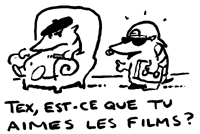2 – Me voici!
Grammaire: 2.4 – Les questions “oui/non”
1. questions with intonation
One of the easiest ways to ask a question that may be answered by yes/no is to raise the pitch of your voice at the end of a statement. In a declarative statement, the pitch normally falls. Listen to the following dialogue and pay close attention to the intonation.
| Tex: Trey, tu aimes la philosophie? | Tex: Trey, do you like philosophy? |
2. questions using ‘est-ce que … ?’
Another way to ask a yes/no question is to place est-ce que before a statement. Note that que becomes qu’ before a vowel.

| Trey: Et toi, Tex, est-ce que tu aimes les films? | Trey: And you, Tex, do you like films? |
| Tex: Bien sûr, j’adore les films. | Tex: Of course, I adore films. |
| Trey: Est-ce que tu connais Yoda? | Trey: Do you know Yoda? |
3. questions using ‘n’est-ce pas ?’
N’est-ce pas? is added to the end of a yes/no question when the speaker expects an affirmative response.
| Trey: Tu connais ‘La guerre des étoiles,’ n’est-ce pas? Yoda, c’est le petit sage. | Trey: You know ‘Star Wars,’ don’t you? Yoda is the little wise man. |

